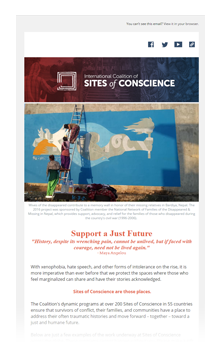The need to remember often competes with the equally strong pressure to forget. Even with the best of intentions – such as to promote reconciliation after deeply divided events by “turning the page” – erasing the past can prevent new generations from learning critical lessons and destroy opportunities to build a peaceful future.
A Site of Conscience is a place of memory – such as a historic site, place-based museum or memorial – that prevents this erasure from happening in order to ensure a more just and humane future. Not only do Sites of Conscience provide safe spaces to remember and preserve even the most traumatic memories, but they enable their visitors to make connections between the past and related contemporary human rights issues. In this way, a concentration camp in Europe becomes a catalyst for discussions on modern xenophobia; a Gulag museum in Russia highlights repression of free speech now; and a 200-year-old slave house in Africa sparks action to help the 40 million people who are still enslaved today.
Founded in 1999, the International Coalition of Sites of Conscience (“the Coalition”) is the only worldwide network of Sites of Conscience. With over 300 members in 65 countries, we build the capacity of these vital institutions through grants, networking, training, transitional justice mechanisms and advocacy. These members and partners remember a variety of histories and come from a wide range of settings – including long-standing democracies, countries struggling with legacies of violence, as well as post-conflict regions just beginning to address their transitional justice needs – but they are all united by their common commitment to connect past to present, memory to action.
Through the efforts of Sites of Conscience, today:
- Civil society organizations working with Rohingya refugees in Bangladesh are being trained to document their own stories of their persecution in Myanmar, with a special focus on supporting women in the community, ensuring that their voices shape the world’s understanding of the human rights abuses that occurred and giving them platforms to shape the future;
- Historic sites and museums in every region of the United States are receiving training to share the stories of how marginalized communities were disproportionately impacted by the COVID-19 pandemic, and equip their communities to be more resilient and compassionate;
- Police officers from both sides of the conflict in Northern Ireland are telling their stories in an oral history project designed to foster trust and understanding among the two factions;
- And through a traveling exhibit to remote areas, thousands of rural school children are learning about the civil war in Sierra Leone (1991-2002) – a war that took the lives of 70,000 people, but which many adults are hesitant to discuss because they fear opening old wounds.
Every one of these activities – and thousands more underway around the globe – has its roots in the past and its sights on the future. Through these conscious and united efforts, the International Coalition of Sites of Conscience connects past to present, changing the world one memory at a time.
For more information on how to get involved, please contact us at: coalition@sitesofconscience.org

